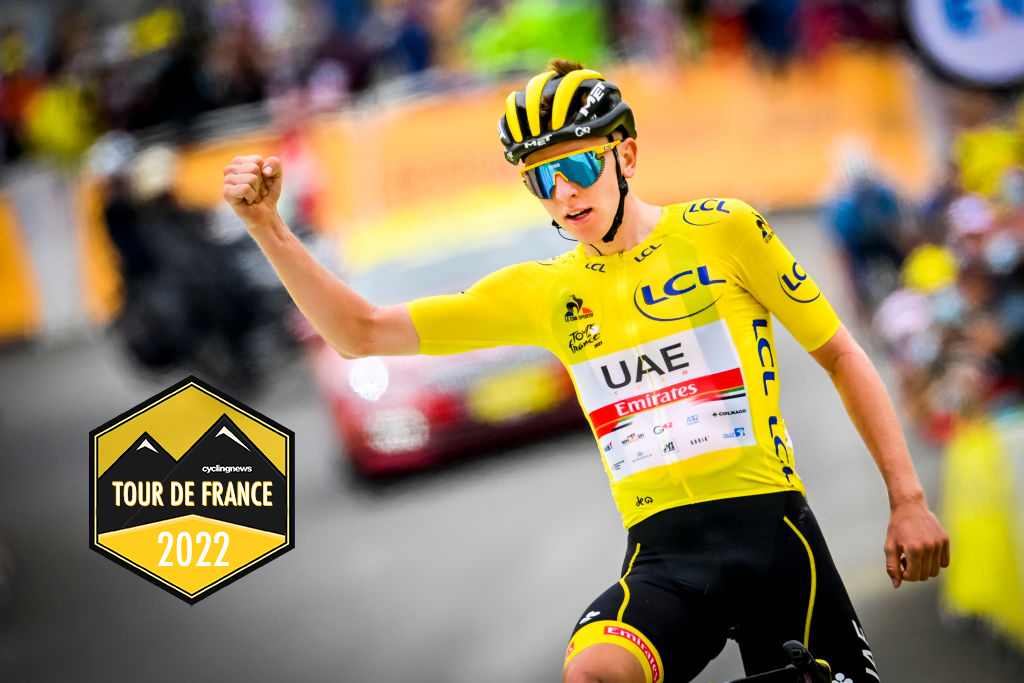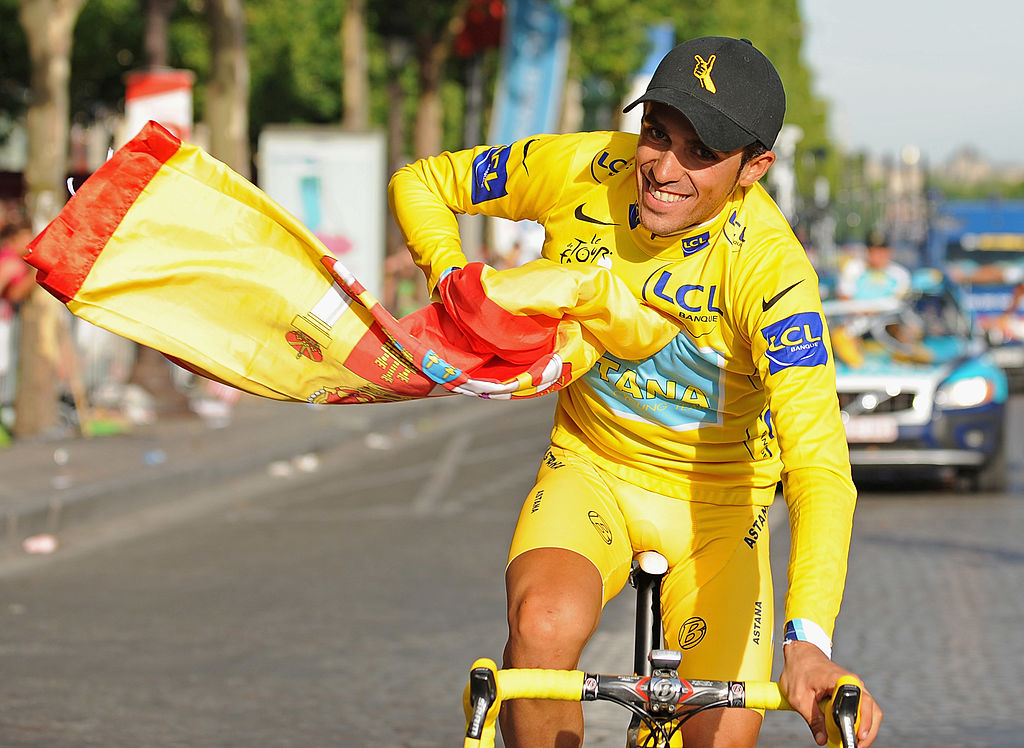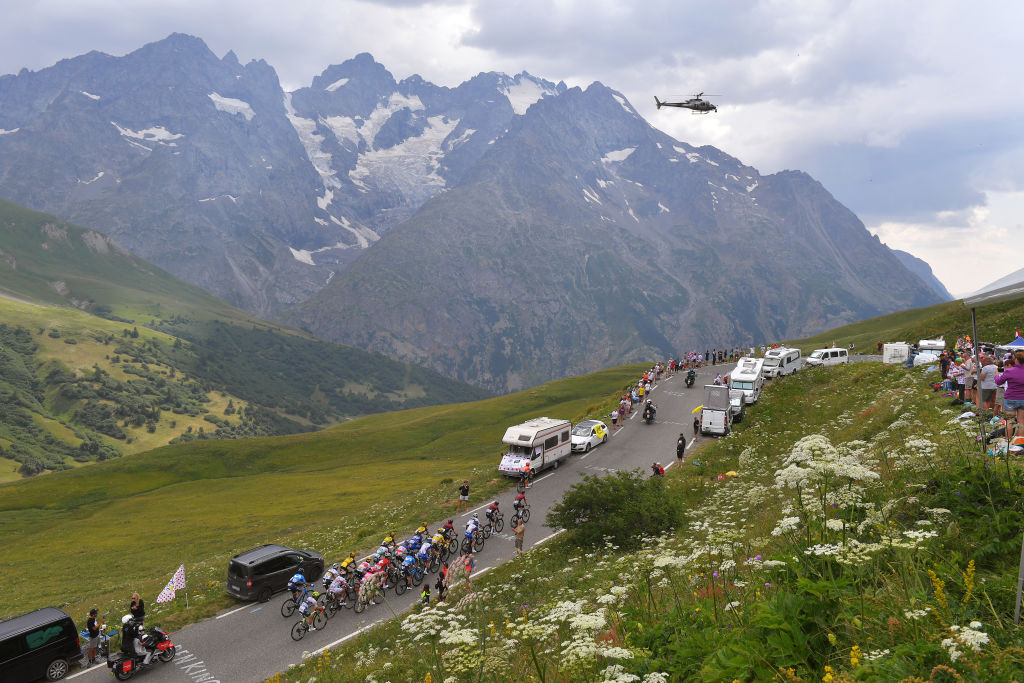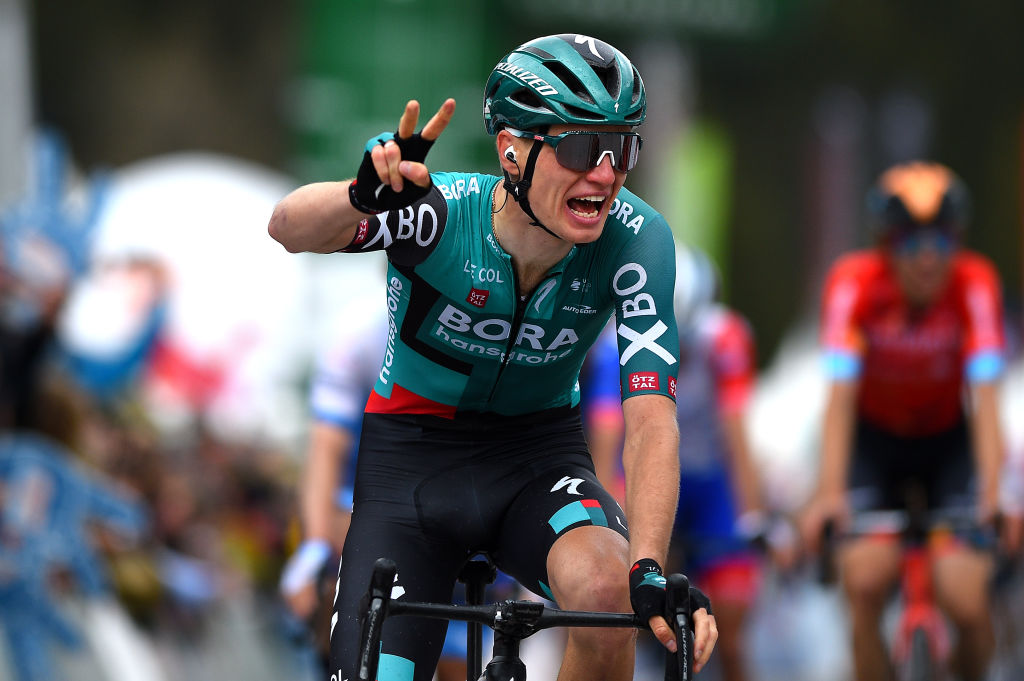'A real cycling prodigy' – Alberto Contador analyses Tadej Pogacar
Two-time Tour winner on the 2022 Tour route, the favourites, and the perils of third week time trials

When he sums up Tadej Pogačar, retired Grand Tour champion Alberto Contador does so in a simple but highly expressive phrase: he is, Contador says, a "real cycling prodigy."
The praise could hardly be higher from the now-retired double Tour de France winner, who also believes that when it comes to Pogačar's chances of a third victory in July this summer, it's his ability to take the constant pressure of being at the top that could well make a key difference.
"Tadej can absorb an enormous amount of stress without it seeming to affect him," Contador told Cyclingnews. "He acts as if that stress was the most normal thing in the world."
"But that's what makes Tadej Pogačar Tadej Pogačar: he's a real cycling prodigy, able to handle the heat of being the Tour de France leader day after day. And that pressure, believe me, can be a real challenge."
Nowhere is that tension more extreme, Contador said, than when a bike rider is leading the Tour de France and all that remains to conquer overall victory is one third-week time trial.
"By that point in the Tour, winning and leading is as much a question of mental strength as much as physical strength," he argued.
"There are always moments in the Tour when your legs are just about to explode, you really can't handle the pain. And you have to go on, you have to stay focussed, you have to keep your morale high.
Get The Leadout Newsletter
The latest race content, interviews, features, reviews and expert buying guides, direct to your inbox!
"But in the last time trial, above all if you're wearing the yellow jersey, that's when it gets really hard.
"If you're second overall, of course you want to go flat out to get the win and the lead. But when you are defending the lead on that stage, you know there's one day to go to Paris and you can lose the maillot amarillo in one afternoon, mentally that takes its toll. That really takes its toll."
On the morning of July 23, when the Tour tackles a 40.7km race against the clock between Lacapelle-Marival and Rocamadour, the odds are the rider in yellow facing that predicament in 2022 could well be Pogačar. But Contador knows what he's talking about, too, from first-hand experience.
In the 2007 Tour, the year of his first win, in the third week the Spaniard had to defend his lead against teammate Levi Leipheimer and 2011 Tour winner Cadel Evans in a 55km time trial. And given the time gaps were minimal for such a long test, just 1:50 on Evans and 2:39 on Leipheimer, and he started shipping time from the start he recalls the mental pressure rapidly began building to an extreme.
"I knew I had to hit the ground running because Evans and Leipheimer were so close behind. But by kilometre 15, they stopped giving me time references from the team car because Levi was gaining on me. I was going ok, but Levi was on fire," said Contador, who finally finished fifth at 2:18.
"I went past a race sign saying '40 kilometres to go' and I remember thinking I had a minute at most on Levi by then and I frantically started doing the maths in my head just the best I could: ok, I can lose a second a kilometre I'll be alright, I said to myself. Finally, I saved the day and after the time trial I was still 23 seconds ahead on Evans overall, but it was very close indeed."
'Anything can happen' in the first part of the Tour

Pogačar has, of course, been on both sides of the fence in the final TT. In 2020 at La Planche des Belles Filles, he started the stage in second, delivering one of the most memorable finales in recent history. And in 2021 at Saint-Emilion's third-week test, he was at the head of the GC table, with a second overall victory well in hand.
Yet if Contador sees Pogačar as the man, on paper, most likely be in yellow again on the eve of the Champs-Elysées stage, he does not think the 23-year-old is destined for an easy ride. For one thing, Contador points out, the route is too unpredictable this year, particularly in the opening leg as far as Planche des Belles Filles on stage 5, to take anything for granted.
"He's the favourite, but the first part of the Tour is very important and anything could happen there," Contador says.
"It's not just that crashes sometimes have a huge effect on that part of the race, but let's see what the weather is like in Denmark and if it could get really windy up there. With that huge bridge at the end of stage 2, 18km long, it'll be a dreadfully nervous day, there could be splits and a lot of big names could [lose] time.
"The pavé on the cobbled stage 5, too, could have a terrible effect, particularly if it rains. And the Planche des Belles Filles, that's a summit finish that everybody knows and is the only big climb that day, but we're reaching it before the end of the first week, so it could really make a mark.
"Throw in a time trial on the first day and it's not just that you have to be ready to hit the ground running on day one. There are plenty of complicated stages where a lot of things could happen."
The other riders are "not going to make it easy for him," Contador warned, before citing Jumbo-Visma with Primoz Roglič and Jonas Vingegaard as the most likely to challenge the young Slovenian.
"They're both very valid options and the team knows how to use those two strategically, then maybe they can put him under serious pressure in the mountains.
"Vingegaard looked awfully strong in the Criterium du Dauphiné. And even if Pogačar is still superior to him, then maybe Jumbo-Visma can work things out another way, say, by attacking from a long way out."
Analysing the crucial stages

If the first 10 days of the race are where the Tour can be lost, then Contador believes he knows exactly where the Tour will start to be won.
"The summit finish on the Col du Granon, with the Telegraphe and Galibier before that, is far more important than what's come before.
"It's an 11km climb, with average gradients of nine or ten per cent, so it could be the one that decides the script of the whole Tour and the lines on which it will play out. Then the Alpe d'Huez [stage 12] the next day will likely firm up what happened the day before.
"So the start of the Tour will be a very intense one, and the Col du Granon will show us who's in form, who's not, and what plans a team like Jumbo-Visma really have, whether it's Roglič or Vingegaard who are going to be the top leader and so on.
"In any case, there's so much that can happen in that first week, starting with the wind and the pavé and so on that having two riders to rely on for GC is a very good idea."
At the other end of the Tour, in its third week, Contador feels that a two-headed squad like Jumbo-Visma will continue to have certain advantages.
"I don't think the Mende finish [stage 14] or the one into Foix [stage 16] will make such a lot of differences between the GC riders, because there's such a long descent off the last climb, nearly 30 kilometres.
"But I think the GC guys will be thinking more about the two summit finishes, the first to Peyragudes [stage 17] and then the Hautacam stage [18].
"The first one is so short you could get GC guys going into the breaks and toughening up the stage from the start," said Contador of an option that teams like Jumbo-Visma could still use assuming both their leaders are still well-placed overall.
"Then the Hautacam is the last chance for the climbers before that final, very long, time trial."
Podium challengers?

When it comes to the nominal pre-race order of favourites, Contador points to experience as being another factor that elevates Roglič and Vingegaard to 'virtual podium' finishes behind Pogačar.
"They both know what it means to finish second in the Tour," he said, "and then there's a whole group of riders who are in line for the podium."
Spain's Enric Mas (Movistar) is one such racer, thanks to his consistency, said Contador, while others include Ben O'Connor (AG2R Citroën), Jack Haig (Bahrain Victorious), Dani Martínez (Ineos Grenadiers) and Adam Yates (Ineos Grenadiers).
Contador also highlights Aleksandr Vlasov (Bora-Hansgrohe) as one of the most promising newcomers into this select group of GC contenders.
"I'd put him in that podium group for sure. He's had a spectacular season so far, and in Suisse he was going really well too. Let's see how COVID-19 has affected and he's a clear contender for the podium. So let's see how much higher he can get, too."
And as for Contador's old sparring partner, Chris Froome (Israel-Premier Tech): "We've seen that despite trying really hard and his motivation, he still can't get back to the level of form that he had before his crash, so let's see how he goes from here. I think that if Froome could get a stage win, that would be good."
Contador himself will have more than one chance to get a ringside view of the action this summer. Since retiring in September 2017 El Pistolero has been working with his Continental team, Eolo-Kometa and with his Foundation in his hometown of Pinto, but he is also now a regular commentator on cycling for Eurosport in Spain.
This summer he will be reporting at the Tour from the pillion seat of an in-race motorbike on six stages.
The Spaniard may not be on the motorbike for the final time trial, but as he said, whether it is from a distance or close up, Pogačar's ability to take the pressure at that point in the game is still more than worthy of his admiration.
"You watch him before the last Tour de France time trial [in 2020] and you can see he's calm and relaxed, chatting away," Contador recollected.
"And then he gets on his bike – and he flies."
Alasdair Fotheringham has been reporting on cycling since 1991. He has covered every Tour de France since 1992 bar one, as well as numerous other bike races of all shapes and sizes, ranging from the Olympic Games in 2008 to the now sadly defunct Subida a Urkiola hill climb in Spain. As well as working for Cyclingnews, he has also written for The Independent, The Guardian, ProCycling, The Express and Reuters.
